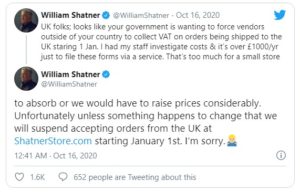Disruption and frustration are apt descriptors of the state of affairs in Britain. Another coronavirus lockdown together with the first month apart from the EU single market and customs union has made for a bumpy beginning to 2021. Both forces – the lockdown and the severing of economic integration with the EU – have contributed to a triple whammy of supply chain interruptions, rising costs and widespread confusion.
On a brighter note, here at Redpoint, we’re fond of discussing the importance of a personalised customer experience, which is true in normal times. In fact, a recent survey Redpoint conducted with Dynata underscores this point, where 70 percent of consumers surveyed said they will shop exclusively with brands that personally understand them.
But what does this have to do with Brexit and lockdown? Well, given that these are not normal times, it’s arguably more important than ever for brands to show customers that they are valued. By continuing to provide a seamless, personalised customer experience, companies can help to maintain a semblance of normalcy as Britain tries to right the ship.
But there are some monumental hurdles.
Many European companies have already announced that they will no longer ship goods to Britain because of the value-added tax (VAT), which for goods valued up to £135 is now collected at point of sale rather than point of import, making EU companies responsible for collecting taxes on behalf of the British government. An online Dutch bike parts company, for example, has stated that the UK is now the only country in the world it will not ship to. And, bizarrely, not even Star Trek’s Captain Kirk can avoid it, with namesake William Shatner tweeting that the shatnerstore.com would have to reluctantly suspend orders to the UK. Conversely, British companies exporting to the EU must now certify the origin of all goods for finished products and all the parts used for assembly, thus creating a bureaucracy, tax and paperwork headache. The headache continues for European lovers of tea, with Fortnum & Mason citing “Brexit restrictions” as the reason it has suspended deliveries to the EU. Also, the 11th-hour Christmas Eve deal does not cover services, which account for roughly 80 percent of British exports.

William Shatner’s Oct. 16 tweets about the VAT costs that he said would prevent ShatnerStore.com from accepting UK orders.
For more details, this article in the Local does a fine job detailing the chaos, which ranges from increased shipping costs and food shortages to fishery disputes and even interruption of entertainment streaming.
A New Look at Value
To complicate matters for brands that were trying to avoid overburdening customers is the fact they had little time to prepare, given that the deal was announced just one week prior to taking effect. The saving grace, is that consumers in Britain and the EU, knowing the situation, are likely willing to absolve brands of any culpability. They know that Britons are all in the same boat. To receive the benefit of the doubt, however, brands must be perfectly transparent about how they’re dealing with interruptions, cost increases and disruption. Customers are more likely to countenance higher prices, delays or stoppages if they are made aware, up front, about the impact.
So to satisfy customer expectations for transparency, brands must shift their focus from the transactional to the intrinsic value of the customer relationship. By demonstrating an understanding and empathy for the customer’s pain points, brands can show that they care about the customer as an individual, beyond the sale.
In a Harris Poll commissioned by Redpoint, nearly half of customers surveyed defined a personalised experience as a brand knowing they’re the same customer across all touchpoints. In addition to personalised recommendations, customised interactions and individualised offers, this means respecting channel and notification preferences and – pertinent to the Brexit situation – knowing the intricate patterns of a customer’s behaviours in order to relay news and updates that are specific to each customer’s situation. Is their size and colour preference impacted by a shipping delay? Will their favourite Bordeaux wine be subject to VAT? By infusing transparency into the customer experience about the Brexit challenges and what they mean for a unique customer, brands may be rewarded with loyalty, despite the nuisance of delays or additional costs.
Really Know Your Customers
Knowing everything there is to know about a customer also becomes paramount with markets undergoing dramatic change. Both British and European companies will have to adjust now that they’re faced with the prospect of losing each other’s customers. So retention of the customers a company is still able to serve, or acquiring customers to make up for a disappearing market will play an important role in determining which companies will weather the Brexit storm.
This need underscores the importance of advanced identity resolution to market to existing customers and prospects with pinpoint accuracy, or to formulate a sound diversification strategy if a brand is delving into new markets or products. Identity resolution ensures an accurate recognition of customers – known and anonymous – across all touchpoints, and it is the foundation for providing highly individualised experiences. By connecting customer records across all devices, systems and sources a company is empowered to deliver relevance with every engagement, at the pace of each customer’s unique journey.
For a Dutch bike parts company no longer shipping to Britain,t may now become a matter of survival to build a German or French customer base, if it didn’t have one already. With advanced identity resolution, it can begin to assemble a single customer view for new customers engaging on the website, mapping individual entities to behaviours and preferences across devices.
A Real-Time Pivot
A rapidly changing customer base also highlights the need for companies to be agile, quickly pivoting to capitalize on new opportunities or to stem losses. With the late-arriving Brexit deal leaving little time for advance preparation, an ability to adjust on the fly to new markets, new taxes and supply chain interruptions becomes an even more important capability.
As the need for agility pertains to audience segmentation or providing a personalised customer experience with real-time decisioning, it is clear that fixed data models are not up to the task. Organisations forced to take data models offline to rebuild them with a new busines objective in mind lose valuable time; customers may forgive a cost increase in exchange for transparency, but they will be less forgiving of a company that seems to ignore the Brexit fallout – particularly as it affects them personally. That is the hidden cost of a stale data model.
Conversely, code-free, self-training models with automated machine learning provides marketers with the agility needed to meet customers with a contextually relevant interaction based on real-time data. With Brexit repercussions resulting in day-to-day and even minute-to-minute change, being able to pivot, in real time, to current conditions is a requirement to satisfy customer expectations for a personalized experience despite fluctuating circumstances beyond a company’s control.
In Trying Times, Keep the Customer First
Just a few short weeks into the Brexit fallout, the only true certainty right now is change. Markets and customer bases have been disrupted, and for UK customers the disruption is exacerbated by a new coronavirus shutdown. With the massive scope of change and disruption to even day-to-day life, it’s reasonable to expect that more than a few companies may figuratively shrug their shoulders, hope for the best, and see where the chips fall before trying to pick up the pieces.
But there is a way forward. The future might look uncertain now, but with a hyper focus on customer data, organisations will begin to see the light at the end of the tunnel. With a single customer view, automated machine learning and real-time decisioning, it is possible to orchestrate contextually relevant, omnichannel interactions with individual customers. A seamless, personalized customer experience may look different post-Brexit, but it does not have to become a casualty of the go-it-alone breakoff from the EU.
All of us Britons, customers and brands, are in this situation together – the pandemic and learning to live with Brexit – so we may as well make the best of it with the tools available. Anyone for tea?!
Related Content
A Contextual Customer Relationship is the Basis for a Superior Experience
A Personalized Customer Experience (CX) Delivers Loyalty
Clear the Hurdles for a Personalized Customer Experience
Be in-the-know with all the latest customer engagement, data management, and Redpoint Global news by following us on LinkedIn, Twitter, and Facebook.
